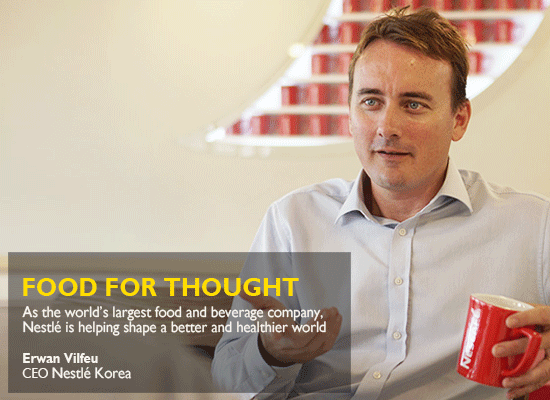Feature Stories
- Home
- Why KOREA
- Feature Stories

As the world’s largest food and beverage company, Nestlé is helping shape a better and healthier world
There are food companies and then there’s Nestlé. As the world’s largest food and beverage company, Nestlé has more than 2000 brands ranging from global icons to local favorites. With a presence in 191 countries, its products are loved by adults and children alike. But the company’s presence goes far beyond chocolate bars and coffee—its purpose is to enhance quality of life and contribute to a healthier future.
Nestlé’s breakthrough
The Nestlé story begins in 1866 when the American brothers George and Charles Page founded Europe’s first condensed milk factory, the Anglo-Swiss Condensed Milk Company in Cham, Switzerland. One year later, a German pharmacist Henri Nestlé, developed ‘Farine lactée’, a baby formula milk in Vevey, Switzerland. Nestlé’s formula milk was offered as a safer and more nutritious alternative to breast milk to mothers, who were unable to breastfeed their babies. Word of Nestlé’s success spread rapidly, and Henri Nestlé was able to build a thriving business through his determination, commitment and a pioneering spirit. His life-saving innovation is what Nestlé has been following for 150 years, and it contributes to the company’s competency in anticipating and fulfilling consumers’ changing needs.
Nestlé wins over Korea
Nestlé has long been a household name in Korea. After the Korean War, Nestlé chocolates and coffee were smuggled out of American military bases and sold on the black market. By the time the company officially entered the Korean market in 1987, Nestlé was already a familiar brand to Korean consumers.
When asked how the company has managed to achieve such great success, Nestlé Korea’s CEO Erwan Vilfeu says that localization was crucial. “Food is so closely linked to culture and because it’s so local, we couldn’t just launch a product that worked elsewhere and expect it to work here,” says Vilfeu, a charming French native who has been at the helm of the Korea for three years.
To fully integrate itself into the local culture, Nestlé has been working closely with Korean companies to further secure its foothold in the country. In 2004, the company started a joint venture with Pulmuone to expand its bottled water operations, while also establishing a joint venture with Lotte Food in 2014 to integrate Nestlé’s portfolio of internationally recognized brands and product expertise with Lotte’s local distribution and management strength. The joint venture produces and provides NESCAFÉ soluble coffees, powdered chocolate and other categories such as pet care and Nestlé professional products.
Vilfeu adds that Nestlé also rigorously implements the 60/40+ program. Applied across all of its food and beverage categories before deciding to launch a product in a market, the program is to secure preference of at least 60 percent of consumers in a blind taste test and additional nutritional “plus” based on criteria recommended by world-renowned health authorities.
Opportunities and challenges
As one of the world’s most wired countries, Korea proved to be an exciting challenge for the Swiss company. Nestlé had to stray away from its traditional marketing strategy, instead coming up with creative and unconventional ways to attract Korean consumers, including opening up a KITKAT flagship store and developing a subscription model for its capsule coffee machine NESCAFÉ Dolce Gusto. But if there’s one thing that the company does best, it’s solving problems through innovative ideas. “Because a lot of Korean consumers check out the product in person and then make the purchase online, we’ve been using omni-channel strategies to stay ahead,” says Vilfeu.
Vilfeu notes that Korea has a highly committed workforce and digitally advanced market, making it the perfect incubator market for Nestlé on a global level. “If you’re in Korea, you can witness what the world is going to look like in the future because the country is so forward-thinking.
But he knows all too well that entry into the Korean market isn’t for the faint of heart. “Korea is a country where everything changes so fast; everything I learned about Korea when I first arrived here has already changed,” he says. And that’s why Nestlé refuses to remain complacent and works tirelessly to make products that better satisfy the needs of Korean consumers.
Throughout the interview, Vilfeu emphasizes that Nestlé isn’t just a food and beverage manufacturer, but a company strongly dedicated to health and wellness. As such, it’s heavily investing in research and development with 39 R&D centers worldwide, which is the largest R&D network in the food industry. It’s even working with Korean electronics giant Samsung’s Strategy and Innovation Center to explore the potential of nutrition science and digital sensor technologies to provide new insights into healthy living. The ultimate goal? To provide individuals with more personalized recommendations around nutrition, lifestyle and fitness than previously possible. And with nutrition in Nestlé’s DNA, the company is helping all of us live a little healthier.
By Esther Oh (estheroh@kotra.or.kr)
Executive Consultant/Invest Korea










